الأسواق
عند تصميم تدخل إنساني وتحديد ما إذا كان سيتم استخدام المساعدات النقدية والقسائم، يجب أن يكون تحليل السوق جزءًا من تحليل الاستجابة الشامل. وثبت أن دعم الأسواق للعمل بشكل جيد يؤدي إلى تعافي أسرع وزيادة المرونة في المناطق المتضررة من الكوارث.
واستثمرت العديد من المنظمات في تطوير أدوات لدعم تحليل السوق وتفكر في البرمجة القائمة على السوق بشكل أكثر شمولية. يشمل ذلك التدخلات التي تستخدم السوق (مثل التحويلات النقدية إلى السكان المتضررين)، بالإضافة إلى التدخلات التي تدعم الأسواق بشكل مباشر (مثل المنح المشروطة للمتداولين لإعادة تشغيل أسواقهم).
Related initiatives
Featured content

Introduction to Market Analysis
دورة تدريبية
This 30 minute online course provides an introduction to the analysis of markets in emergency contexts, with input from some of the world’s leading thinkers on the topic.

A Practical Guide to Market Analysis in Humanitarian response
دورة تدريبية
A three to four hour online course designed to provide future humanitarian market assessment team members with a solid understanding of theory and steps of market assessments so that they can join assessment teams prepared with a basic understanding of what they will be doing and why.
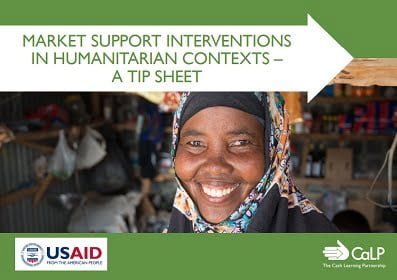
Market Support Interventions in Humanitarian Contexts – a Tip Sheet
Guidelines and Tools
This tip sheet defines what market support programming in humanitarian contexts is, and what it can look like in practice. It enables humanitarian practitioners to systematically consider market support interventions alongside other programme activities. The scope includes support interventions focusing on supply/availability and on demand/access. The tip sheet is based on secondary data...
Latest
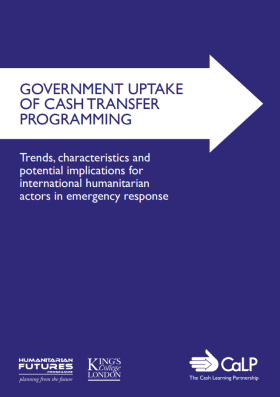
Government Uptake of Cash Transfer Programming: Trends, characteristics and potential implications for international humanitarian actors in emergency response
Policy paper
Trends, characteristics and potential implications for international humanitarian actors in emergency response. This thematic report has been undertaken as part of a 2013 research study entitled, Is Cash Transfer Programming ‘Fit for the Future’? The research was commissioned by the the CALP...
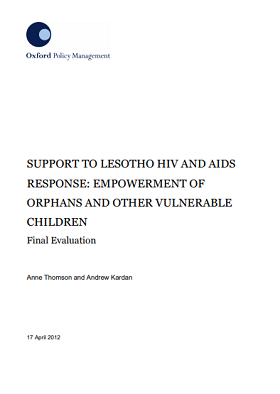
Support to Lesotho HIV and AIDs Response: Empowerment of Orphans and Other Vulnerable Children
Report
Oxford Policy Management (OPM) has been contracted by UNICEF Lesotho to undertake the final evaluation of the Project “Support to Lesotho HIV and AIDS Response: Empowerment of Orphans and Vulnerable Children”. The main objective of this evaluation is to provide decision makers in the Government of...

Scoping study – Emergency cash transfer programming in the WaSH and shelter sectors
Report
Over the past few years, the dialogue on cash transfer programming has progressed beyond initial debates about whether distributing cash and vouchers is a valid response modality at all to a general acceptance of their added value in appropriate contexts. Beyond the livelihoods and food...
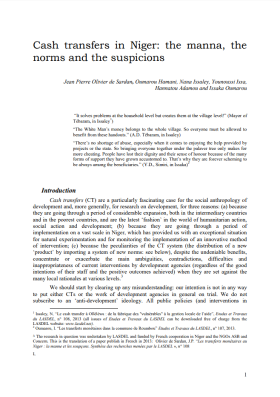
Cash transfers in Niger: The manna, the norms and the suspicions
Report
Cash transfers (CT) are a particularly fascinating case for the social anthropology of development and, more generally, for research on development, for three reasons: (a) because they are going through a period of considerable expansion, both in the intermediary countries and in the poorest countries,...
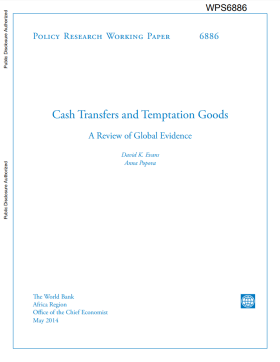
Cash Transfers and Temptation Goods: A review of global evidence
Report
Cash transfers have been demonstrated to improve education and health outcomes and alleviate poverty in various contexts. However, policy makers and others often express concern that poor households will use transfers to buy alcohol, tobacco, or other “temptation goods”. This paper reviews 19...
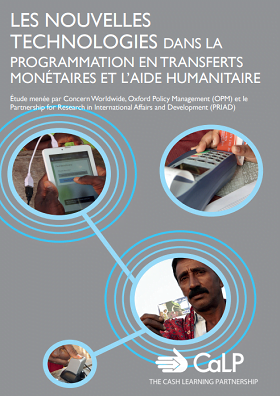
Les nouvelles technologies dans la programmation en transferts monétaires et l’aide humanitaire
Report
Le CALP Network a chargé Concern Worldwide de diriger un consortium également constitué d’Oxford Policy Management (OPM) et de Partnership for Research in International Affairs and Development (PRIAD) afin d’analyser l’utilisation actuelle des nouvelles technologies appliquées aux programmes...
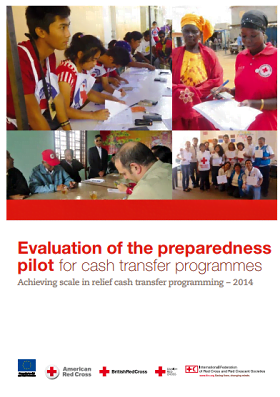
Evaluation of the Preparedness Pilot for Cash Transfer Programmes – Achieving scale in relief cash transfer programming – 2014
Report
It is recognized that cash transfer programming can be effective in supporting populations affected by disasters in a way that maintains dignity and choice for beneficiaries while stimulating local livelihoods, economies and markets. However, the majority of cash transfer programming has been undertaken...
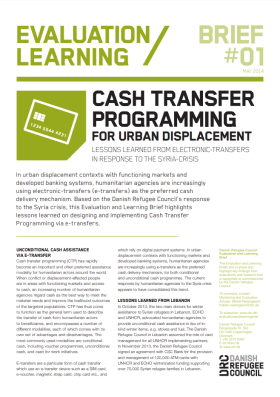
Cash Transfer Programming for Urban Displacement
Policy paper
In urban displacement contexts with functioning markets and developed banking systems, humanitarian agencies are increasingly using electronic-transfers (e-transfers) as the preferred cash delivery mechanism. Based on the Danish Refugee Council’s response to the Syria crisis, this Evaluation and...
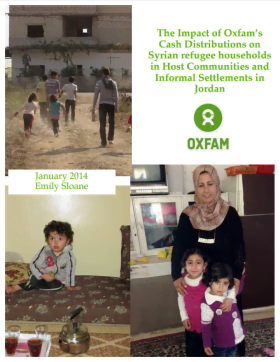
The Impact of Oxfam’s Cash Distributions on Syrian Refugee Households in Host Communities and Informal Settlements in Jordan
Report
Given the absence of viable alternatives to cash transfer programmes (CTPs) in Jordan, such programmes will certainly continue for the foreseeable future. It is crucial to review their impact to date in order to identify common issues and lessons learned and adjust programmes accordingly. The present...
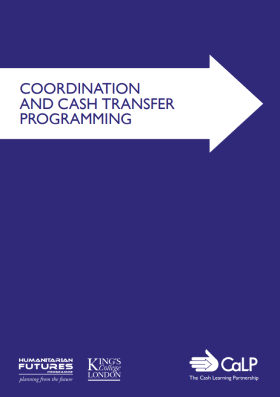
Coordination and Cash Transfer Programming
Policy paper
This thematic report has been undertaken as part of a 2013 research study entitled, Is Cash Transfer Programming ‘Fit for the Future’? The research was commissioned by the the CALP Network and undertaken by the Humanitarian Futures Programme (HFP), King’s College London. The overall...
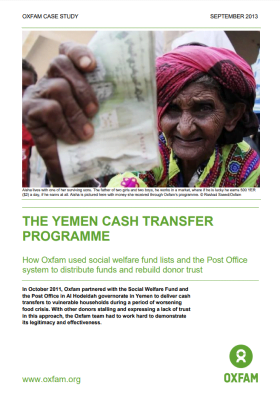
The Yemen Cash Transfer Programme
Report
This case study shows how Oxfam used social welfare fund lists and the Post Office system to distribute funds and rebuild donor trust. In October 2011, Oxfam partnered with the Social Welfare Fund and the Post Office in Al Hodeidah governorate in Yemen to deliver cash transfers to vulnerable households...
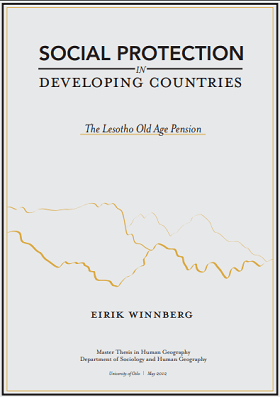
Social protection in developing countries – The Lesotho Old Age Pension (MSc Thesis)
Report
By using the example of the noncontributory pension scheme in Lesotho, the author explores the process of implementing social protection in developing countries, looking at how constraints can be overcome and what consequences can be found. This paper also looks at the justification for directing such...

Cash-for-shelter pilot findings in CRS’s Typhoon Haiyan Response
Report
In order to explore possible strategies for shelter assistance that would also benefit local markets, a cash transfer pilot study was conducted in which beneficiaries received cash to purchase shelter materials and to hire labourers. CRS promoted disaster-resilient construction techniques and employed a...
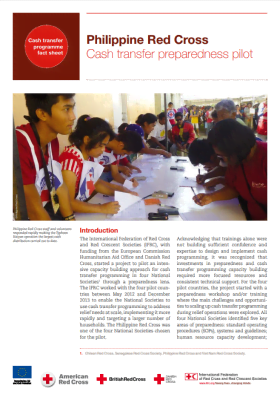
Cash Transfer Preparedness Pilot – A Cash Transfer Programme Fact Sheet
Policy paper
The International Federation of Red Cross and Red Crescent Societies (IFRC), started a project to pilot an intensive capacity building approach for cash transfer programming in four National Societies through a preparedness lens. The IFRC worked with the four pilot countries between May 2012 and...

Refugee Economies: Rethinking popular assumptions
Report
‘Refugee economies’ remain under-researched and poorly understood and there is a lack of good data available on the economic lives of displaced populations. Existing economic work on refugees tends to focus narrowly on refugee livelihoods or on the impact on host states. Yet, understanding these...
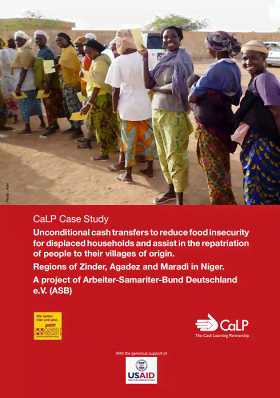
The CALP Network case study – Unconditional cash transfers to reduce food insecurity for displaced households and assist in the repatriation of people to their villages of origin – Niger
Report
In 2012, Niger was affected by a food crisis that caused large population displacements. The NGO Arbeiter- Samariter-Bund Deutschland e.V. (ASB) distributed unconditional cash transfers in areas of food insecurity to improve food access for those displaced and those affected, and to help repatriate...

Financing of Cash Transfer Programming
Policy paper
This thematic report has been undertaken as part of a 2013 research study entitled, Is Cash Transfer Programming ‘Fit for the Future’? The research was commissioned by the the CALP Network and undertaken by the Humanitarian Futures Programme (HFP), King’s College London. The overall...
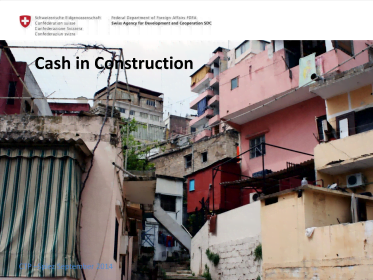
Cash in Construction
Presentation
This Powerpoint was used by SDC during a workshop on CTP and shelter/construction that took place in mid 2014. Click here to download a short introduction Powerpoint on Cash and Shelter from the same event.

The Public Pursuit of Secure Welfare: Background Paper on International Development Institutions, Social Protection & Developing Countries
Report
This paper provides an overview of the development of the conceptual framework underlying social protection programming and policy among the key international development institutions active in this sector. It sets out the historical, institutional and political factors underlying the current debate,...
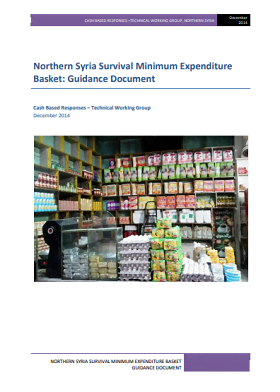
Northern Syria Survival Minimum Expenditure Basket: Guidance Document
Report
The Survival Minimum Expenditure Basket (SMEB) outlines the minimum culturally-adjusted items for survival for a household in Syria for one month. The basket comprises the basic energy requirements of 2,100 kilocalories per person per day, fuel for cooking, and non-food items. The attached guide has been...